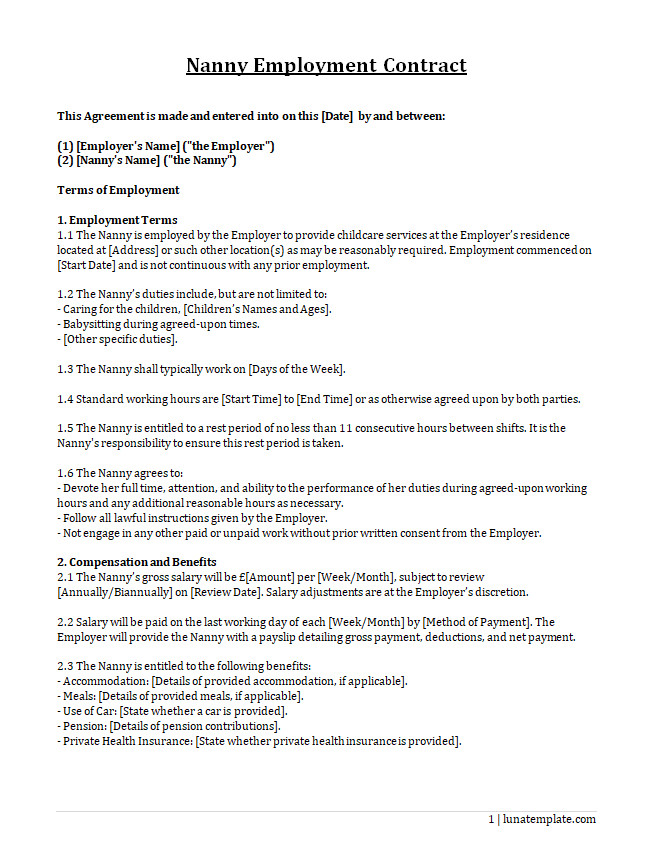When hiring a nanny, it’s not just a matter of finding the right person for the job. It’s also crucial to establish clear expectations and boundaries to ensure a successful and harmonious working relationship. This is where a nanny contract comes into play.
A nanny contract isn’t just a formal agreement; it serves as a foundation for a successful working relationship between you and your nanny.
What’s a Nanny Contract?
A nanny contract is a written agreement between a family and a nanny that outlines the terms and conditions of employment. It serves as a legally binding document that clarifies the expectations, responsibilities, and rights of both parties involved.
By having a nanny contract in place, both the family and the nanny can have a clear understanding of what is expected, which helps to prevent misunderstandings and conflicts down the line.

Why is a Nanny Contract Important?
A nanny contract is essential for several reasons:
- Clear expectations: A nanny contract clearly outlines the expectations and responsibilities of both the family and the nanny. This ensures that everyone is on the same page and understands what is expected of them.
- Legal protection: A nanny contract provides legal protection for both parties. It helps to prevent misunderstandings and disputes, and it can be used as evidence if any legal issues arise.
- Open communication: A nanny contract encourages open communication between the family and the nanny. It provides a platform for discussing any concerns or changes in expectations, allowing both parties to address issues promptly and find solutions together.
- Professionalism: Having a nanny contract in place shows professionalism and demonstrates that both the family and the nanny take their roles seriously. It sets the tone for a professional working relationship.
What to Include in Nanny Contracts?
A comprehensive nanny contract should include the following:
- Names and contact information: Include the full names and contact information of both the family and the nanny.
- Job description and responsibilities: Clearly outline the nanny’s job duties and responsibilities.
- Work schedule: Specify the days and hours the nanny is expected to work.
- Compensation: Clearly state the nanny’s salary or hourly rate, as well as any additional benefits or reimbursements.
- Vacation and sick leave: Outline the nanny’s entitlement to vacation days and sick leave.
- Termination clause: Include a termination clause that outlines the conditions under which either party can terminate the contract.
- Confidentiality agreement: If necessary, include a confidentiality agreement to protect the family’s privacy.
How to Write a Nanny Contract
Writing a nanny contract may seem overwhelming, but it doesn’t have to be. Here are the steps to follow:
- Gather information: Collect all the necessary information, including the family’s contact details, the nanny’s qualifications, and the job description.
- Outline the terms: Clearly define the terms of employment, including the work schedule, compensation, and benefits.
- Add specific clauses: Include specific clauses that address important issues such as vacation and sick leave, termination, and confidentiality.
- Review and revise: Review the contract carefully and make any necessary revisions. It’s essential to ensure that both parties are comfortable with the terms and that everything is clear and concise.
- Sign and date: Once both parties are satisfied with the contract, sign and date it. Make sure to keep a copy for both the family and the nanny.
Paying Your Nanny
When it comes to paying your nanny, it’s crucial to establish a fair and transparent system. Here are some considerations:
- Salaried or hourly: Decide whether you will pay your nanny a salary or an hourly rate. Consider factors such as the nanny’s experience, job responsibilities, and local wage laws.
- Overtime: Determine how you will handle overtime if your nanny works more than the agreed-upon hours.
- Benefits and reimbursements: Consider whether you will provide additional benefits or reimbursements, such as health insurance or transportation expenses.
- Payment schedule: Agree on a payment schedule that works for both parties, whether it’s weekly, bi-weekly, or monthly.
- Payment method: Decide on the payment method that is most convenient for both parties, such as direct deposit or cash.
- Record-keeping: Keep accurate records of your nanny’s hours worked, payments made, and any additional expenses. This will help to ensure transparency and avoid any disputes in the future.
Conclusion
A nanny contract is essential for establishing a successful and harmonious working relationship with your nanny. By clearly outlining the expectations, responsibilities, and rights of both parties, a nanny contract helps to prevent misunderstandings and conflicts. It also provides legal protection and encourages open communication between the family and the nanny.
By following the steps outlined in this guide and considering the factors involved in paying your nanny, you can create a comprehensive and fair nanny contract that sets the stage for a successful and professional working relationship.
Nanny Contract Template – Word